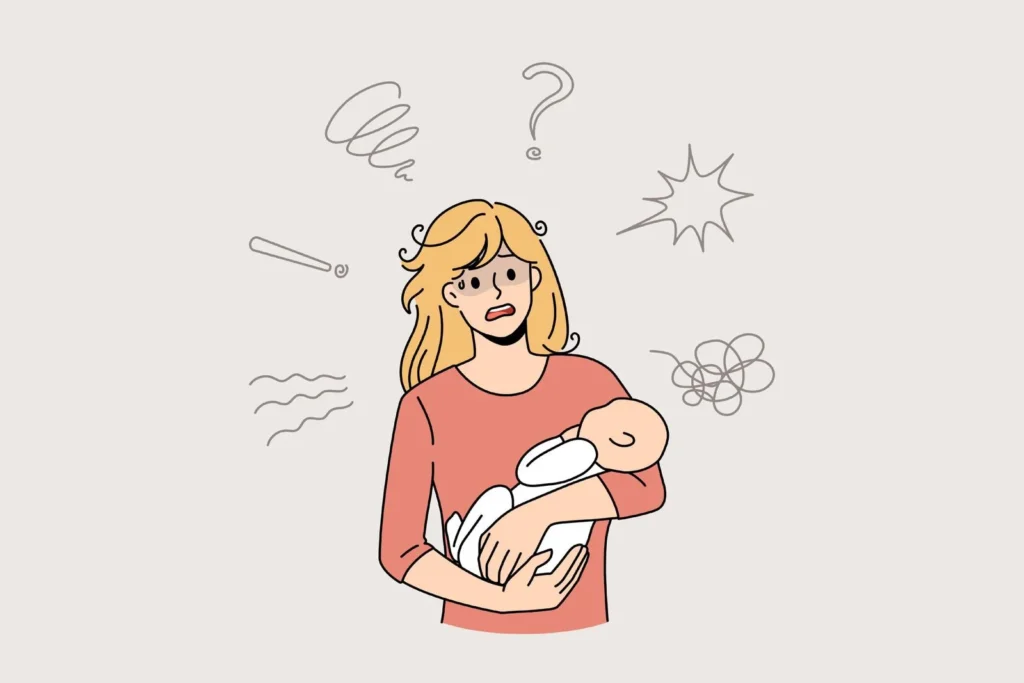Postpartum fatigue is when new moms experience a decreased capacity for any activities, both mental and physical, after having a child. This fatigue can take the form of:
- Not feeling rested after sleep
- Having a persistent lack of energy
- Cognitive impairments
- Mood issues
Not as much research has been given to the concept of postpartum fatigue or how to overcome it despite the fact that an average of 47% of new moms have reported experiencing postpartum fatigue symptoms, and 63% of low-income mothers report the same.
It’s common for women to ask, “How long does postpartum fatigue last?” or “When does postpartum fatigue go away on its own?” or even “When should I see a doctor about symptoms of postpartum fatigue?”
Postpartum fatigue is common among new mothers and it’s important to address postpartum fatigue symptoms for your well-being and that of your new baby. This article will offer expert-backed advice and practical tips for overcoming postpartum fatigue.

Postpartum fatigue
Postpartum fatigue is directly related to the changes brought about after childbirth and the requirements of caring for a new child. General tiredness can happen when an individual doesn’t get enough sleep for one night or works particularly hard in a physical activity during the day but postpartum fatigue is something that remains and impacts several areas of daily function.
During the postpartum phase, new mothers provide nocturnal infant care, which disrupts their regular sleep cycle.
Under normal circumstances, sleep efficiency, which refers to the amount of time you spend sleeping relative to the amount of time you spend in your bed, is high, with most people spending almost equal amounts of time in bed as they do sleeping. However, during the postpartum phase, new mothers experience very low sleep efficiency, spending a lot of time in bed but not actually sleeping. This sleep efficiency is at its lowest point immediately after giving birth and improves slightly as a new baby shifts its sleeping patterns to nighttime sleeping.
However, when mothers experience postpartum fatigue, their melatonin gets transmitted through the breast milk to infants. This becomes a problem that exacerbates issues of postpartum fatigue because it means mothers don’t naturally absorb as much melatonin which is critical to falling asleep quickly and staying asleep.
The result is that new mothers struggle with regular fragmented sleep.
This can be exacerbated by worries over caring for the new child and spending a lot of time breastfeeding. New mothers who struggle with anxiety about caregiving are more likely to have issues falling asleep because of intrusive thoughts, and they are also more likely to have regular sleep disturbances where they wake up several times throughout the night.
The importance of addressing postpartum fatigue symptoms
It is important to recognize and address symptoms of postpartum fatigue because it can compromise the well-being of the mother and the child. Several studies have found that postpartum fatigue has a role in contributing to depression and that it can impede attachment to new babies.
Symptoms of postpartum fatigue
Symptoms of postpartum fatigue can look slightly different in each mother but, in general, include:
- Extreme tiredness
- Feeling exhausted throughout the day, no matter how much you sleep
- Having a lack of energy all day
- Struggling with concentration
- Experiencing brain fog or Mommy’s brain
- Struggling with symptoms of depression or anxiety
- Feeling wired all the time but also feeling exhausted all the time
- Having trouble sleeping, getting to sleep, staying asleep
Typical duration of postpartum fatigue
There are a few factors that affect how long your postpartum fatigue lasts. This includes:
- Whether you can adjust your schedule to that of your newborn
- How well your baby sleeps
- How much sleep you get
- The support you have at home
- Whether you are also doing things like work
The typical duration for postpartum fatigue is different for everyone. Don’t worry if your fatigue symptoms are lasting a bit longer than your sister, mother, friend, or neighbor.
As a new mom, it’s important to recognize that there is a wide range of what’s considered normal during the postpartum experience. If your feelings of postpartum fatigue and general exhaustion haven’t gone away within a few days, don’t beat yourself up. Exercise patience and use postpartum fatigue treatment options that are easily Incorporated at home.
The typical duration for postpartum fatigue is relatively short, but it’s contingent upon how quickly you and your child move through different stages of postpartum recovery.

Stages of postpartum recovery
How long does postpartum fatigue last? Let’s look at the stages of postpartum recovery.
- Some studies have found that within the first ten days after giving birth, nearly half of all new moms report that they feel fatigued.
- One month after giving birth, only around 25% of mothers who reported fatigue in the first ten days still experienced postpartum fatigue symptoms.
- One year after a baby’s birth, only 11% of mothers who reported fatigue within the first ten days still had feelings of exhaustion.
Remember that there are plenty of reasons why you might be exhausted with problems concentrating and daytime fatigue within the first few days after you have your newborn.
- To begin with, your body is trying to recuperate from the physical challenge of having a baby. If you had a C-section, you’ll also need extra time to recover from your surgery.
- Tangentially, this is the time frame when your newborn needs the most attention at all hours of the day and night. So, the sleep that you get is likely fragmented and not very restorative. This is completely normal, and it shouldn’t be any reason for concern.
- Sleep is going to be difficult within the first few months of having a baby, and it might be unreliable as your baby sleeps during the day and wakes up at night.
- If you are breastfeeding, you are more likely to experience postpartum fatigue because you’re waking up every few hours for feedings, and your body releases prolactin to stimulate milk production. Unfortunately, prolactin changes your dopamine levels and makes you feel sleepy most of the time.
- Even mothers who bottle feed can experience comparable levels of fatigue to those who breastfeed.
But once your baby starts to establish a routine, a few months after they are born, you’ll be able to adjust your sleep pattern as well and at this point, you’ll notice a decrease in your fatigue.
Expert tips for managing postpartum fatigue
Symptoms of postpartum fatigue can get worse when new moms struggle with insufficient sleep and sleep debt. Without getting enough sleep at night, you are more likely to endure issues throughout the day like:
- Daytime sleepiness
- Problems concentrating
- Cognitive deficits
- Mood issues
- Fatigue
- Immune and inflammation problems
Prioritize Rest and Sleep
Symptoms of postpartum fatigue might seem never-ending and it can make it difficult for you to prioritize your rest especially if what little rest you get is not particularly restful. However, there are some things you can do to make this better.
Prioritize your rest, too
As a new mom, it can be difficult to prioritize your need to sleep or rest. This is especially true if your partner or spouse is working full-time. However, even if they go to work every day, you are still going to work as a new mom, and it’s important that you both take turns with things like nighttime feedings.
If you swap things like nighttime feedings and put some bottles aside so that your partner can handle a couple of feedings while you sleep, you are less likely to endure several days’ worth of sleep debt. It is better for everyone in the family if you can share these responsibilities.
Short Naps
One way that you can prioritize rest and sleep as a new mom is to take naps. Short naps might be more feasible, especially if you have someone who can watch your new baby for a short period of time or if you schedule your naps at the same time as your child.
Short daytime naps have been shown to effectively counter the negative outcomes associated with sleep debt, especially daytime sleepiness. As a new mother, taking just a 30-minute nap throughout the day can have a profound change in your mood, your energy levels, and your cognitive function.
That said, for many people, it’s a little challenging to fall asleep on command, but once you notice your child has gone to sleep, you can try to incorporate a short nap by using relaxation techniques to help you fall asleep quickly.
Tip: Studies have confirmed that using relaxation techniques, particularly mindfulness and relaxation techniques like those listed below, can increase the quality of your naps, how quickly you fall asleep, and how long you stay asleep.

Nutrition and Hydration
What you eat and drink throughout the day will have an impact on your sleep. With so much going on as a new mother, it can be tempting to turn to quick, easy food or caffeinated beverages to keep you going when you are struggling with daytime sleepiness or fatigue.
But too often, that means accidentally eating something full of sugar right before bed or having a drink with too much sugar or caffeine right before bed.
The timing of what you eat and the quality of what you eat play a role in how well you sleep. Tangentially, if you are dehydrated, you might mistake that feeling for hunger and end up overeating, which can keep you awake as well. Signs and symptoms of postpartum fatigue, like daytime sleepiness, problems concentrating, or a light headache, might be the result of dehydration, which can be quickly fixed with a bottle of water that you keep at your side.
Studies have shown that the best sleep comes after well-balanced nutrition with a good combination of carbohydrates, fats, and proteins.
If you can, prepare or have someone prepare well-balanced meals that are quick and easy without compromising your nutritional health. This might be meal plans that someone helps you prepare or food that gets delivered. The more you can keep a well-balanced meal with good hydration, the better your body will be able to produce things like melatonin, which can encourage better sleep.
Physical Activity
Several studies have confirmed the efficacy of physical activity on sleep quality and mood. Even as a new mother, sleep quality plays a critical role in promoting your overall health, reducing your risk of medical illnesses like cardiovascular disease and mental health issues like depression.
Low to moderate-intensity exercise can reduce daytime sleepiness and fatigue.
The CDC recommends that everyone incorporate a variety of moderate to vigorous intense physical activities throughout the day in order to stay healthy, especially to promote sleep. Physical exercise is a recommended complementary approach to addressing sleep problems like postpartum fatigue. Systematic reviews confirm that exercise throughout the day or simple physical activity like going for a walk around the neighborhood with your new baby can improve:
- How quickly you fall asleep
- How long you stay asleep
- How deeply you sleep
Physical activity is significantly correlated with a decrease in REM sleep, encouraging deeper sleep that helps improve cognitive function and mood.
Mind-body exercises
Surveys have confirmed that physical activity can have a profound impact on sleep. This type of postpartum fatigue treatment doesn’t have to be strenuous or extensive. As a new mom, it can be challenging to find time during the day to get a full workout in, but alternative mind-body exercises can help, including:
- Yoga
- Tai chi
Low-intensity to moderate-intensity Tai Chi programs can improve sleep quality.
Women show a higher responsiveness to alternative mind-body exercises like yoga and Tai Chi, and neither require any experience in the practice or a particular level of fitness. Nearly half of the adults who utilized this type of low-grade physical activity saw a significant improvement in insomnia symptoms. Symptoms of postpartum fatigue can be managed with even a 10-minute interval of things like yoga or Tai Chi before bed or several intervals throughout the day.
Studies have found that moderate physical activity at home, like walking, daily home exercise, yoga, pilates, or Tai Chi, has a more significant impact on sleep quality compared to vigorous physical exercise.
The takeaway? Moderate physical activity is one of the most important things you can do as a new mom to help you deal with fatigue postpartum symptoms. Don’t put pressure on yourself to try and do heavy exercise or exercise for several hours each day. Instead, find time to do little things, regularly.
Mindfulness and Relaxation
Studies have confirmed that the use of mindfulness practice, specifically attention control, acceptance, and awareness can offer improved sleep and reduce the number of times you wake up during the night.
Mindfulness works by overcoming cognitive processes that are characterized by anxiety and stress, which would otherwise disturb a healthy and sustainable sleeping pattern for new moms. mindfulness-based stress reduction is a way to overcome postpartum fatigue symptoms like problems falling asleep or staying asleep. It gives you the tools to reframe some of your concerns or more intrusive thoughts.
Tip: Invest in relaxation apps that do guided visualization or progressive relaxation or listen to short, guided meditations that you can play as soon as you have a small break, or as you are taking a walk around the neighborhood.
Studies have found that mindfulness-based stress reduction significantly improves:
- Sleep Quality
- Sleep duration
National surveys have confirmed that the use of relaxation techniques and relaxation training as a form of complementary and alternative medicine can offer improved sleep quality, reduced wakefulness, and longer sleep among adults. Some examples of techniques include:
- Deep breathing exercises
- Visualization
- Progressive muscle relaxation
- Meditation
The takeaway? Mindfulness can help you put aside anxious thoughts that always seem to pop up right when you try to go to sleep. This can improve your ability to take naps or get a full night of sleep while caring for your new baby.
Setting Realistic Expectations
As is the case with all things, you need to set realistic expectations. Learning how to meditate or incorporating 10 minutes of yoga in the morning and then in the evening is not going to magically make postpartum fatigue symptoms disappear. However, if you practice these tips as part of your postpartum fatigue treatment and you do so regularly, you will see improvement after a few weeks.
The most important thing is that you remain consistent. Try to take naps when you can and use things like visualization or deep breathing exercises to help you fall asleep. If it doesn’t work one day, try again when you go to bed and then when you take a nap the next day.

Potential treatments and interventions
There are several potential postpartum fatigue treatments and interventions available. Many of these center on lifestyle adjustments. If you reach out to your healthcare provider, they might help you review ways in which you can change your lifestyle to better accommodate sleep, like having support from a family member, neighbor, or even a church community, changing your diet, or incorporating exercise.
When you reach out to your physician, you might be able to connect with local Mother support groups that offer things like group yoga for new moms or gentle Tai Chi. In some cases, you might get professional therapy or medication from a qualified psychiatrist where necessary. Working with someone qualified in postpartum treatments can ensure that any medication or treatments provided do not interfere with the health of the baby or any breastfeeding.
Differentiating between normal postpartum fatigue and signs of more serious conditions
Roughly 19% of women experience postpartum depression. Postpartum depression does include symptoms of fatigue and low energy as well as low mood, but it is also accompanied by severe depression symptoms, including hopelessness and a complete lack of enjoyment in activities you once loved. Postpartum depression is a serious condition that can make it challenging for women to care for their own children.
A history of depression can influence the risk of postpartum depression.
Postpartum insomnia is another condition that might look very similar to normal postpartum fatigue. Women who experience postpartum insomnia experience the symptoms immediately after giving birth, and it includes severe difficulty falling asleep, where women stay in bed for several hours before they fall asleep. It can also include an inability to stay asleep, where women fall asleep quickly but then wake up and can’t go back to bed. In other cases, women with postpartum insomnia wake up too early by several hours and find that they can’t go back to bed no matter how tired they are.
12.8% of women experience insomnia, and postpartum insomnia can bring with it a severe risk of depression and is often linked with postpartum depression. This is more likely in women who have already experienced insomnia or have an insomnia disorder.
When to consult a healthcare provider about postpartum fatigue
When does postpartum fatigue go away? If it doesn’t go away on its own, it might be time to consider consulting a healthcare provider. Healthcare providers can help you with pharmacological postpartum fatigue treatment or access to things like therapy.
- You should consult a provider if you notice signs of secondary issues like postpartum insomnia or postpartum depression.
- You should consult a provider if you notice your fatigue postpartum getting worse instead of better.
- You should consult a provider if you are experiencing severe impacts on your daily function or any form of thoughts of self-harm or harm to others.
Summing Up
Overall, knowing postpartum fatigue symptoms and what you can do at home for postpartum fatigue treatment is a great way to control your sleep and improve your energy levels while caring for your child and yourself. If you notice that signs continue to linger long after they should go away on their own or you are struggling with signs of more serious conditions like postpartum depression, always reach out for help.
As a new mom, you need to be able to recognize, address, and seek support for postpartum fatigue or any other condition. Take proactive steps toward your health and well-being, and remember that it’s okay to ask for help.